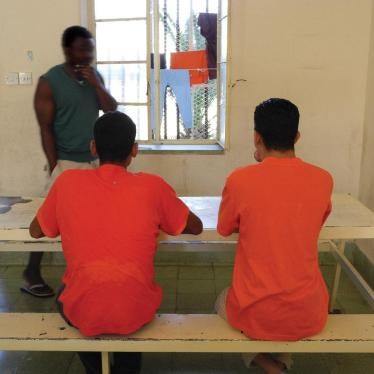Kelile T. fled Ethiopia when he was 17, crossing the Mediterranean in search of refuge. When he arrived in Malta, he was detained and was taken to the Safi immigration detention facility.
During nine months in detention, his mental health declined and he was transferred to a hospital for 15 days of mental health treatment. When Human Rights Watch interviewed him in March after his return to Safi, he said: “I take medicine now, for sleep. No medicine, I can’t sleep… My mind is no good. This is a hard place. I need a free place.”
Malta should be proud of its recent ratification of the United Nations Convention on the Rights of Persons with Disabilities, a crucial tool for protecting the rights of more than one billion people with disabilities worldwide.
As the Government begins to integrate the convention into its laws and policies, it should understand that the protections apply to the thousands of migrants and asylum seekers who linger in immigration detention in Malta each year.
Many of them suffer mental trauma before fleeing their own countries or during harrowing months-long migration across the Sahara and the Mediterranean. And some experience a decline in mental health while detained.
In a July 2012 report – Boat Ride To Detention – Human Rights Watch documented stories of many migrants like Kelile. Malta detains virtually every migrant who arrives by boat for up to 12 – or even 18 – months. This includes even vulnerable migrants who have been persecuted or who have a physical or mental disability, though some efforts are made to identify and release vulnerable migrants early.
Detention, especially when prolonged, can seriously affect the mental health of migrants. Research has shown that it can cause higher rates of post-traumatic stress disorder, anxiety and depression and exacerbate pre-existing symptoms, including mental trauma sustained while fleeing torture or persecution.
Even when a migrant has not suffered trauma before reaching Malta, immigration detention takes a substantial toll on migrants’ mental health, especially for children. Migrant children in detention are at risk of a variety of psychosocial and developmental problems, including feelings of isolation, detachment and a loss of confidence.
Many of the people that Human Rights Watch has interviewed said that their mental health deteriorated because of their long stays in detention.
Maka O, a migrant from Nigeria who spent 10 months in detention, said: “I was going crazy in that place. It was not good for my head.”
The process of integrating the disability rights treaty into domestic laws and policies is a good opportunity for Malta to review the practice of automatically detaining migrants. A review of Malta’s immigration detention policies is already under way. The rights and protections enshrined in the disability rights convention should be carefully considered as part of the review.
The disability rights convention mandates a wide range of rights protections for people with disabilities, including a right to access health services related to their disabilities. The convention also lays down that the existence of a disability shall in no case justify a deprivation of liberty, even when the primary purpose is protection.
The Maltese Government has said that its detention policy is a protective measure that serves migrants’ best interests by allowing the Government to identify vulnerable migrants and provide them care.
However, this could also be accomplished by offering health and social services in open centres without subjecting migrants to the mental distress of prolonged detention.
Our research found, in fact, that the process of identifying migrants with mental health problems in immigration detention can be ad hoc. While people in detention have some access to mental health services, including stays in a psychiatric hospital, the problem of mental health decline as a result of detention remains unaddressed.
In an effort to integrate the disability convention into its laws and policies, Malta should end routine detention of migrants and asylum seekers who arrive by boat. It should also properly equip officials meeting migrants’ boats as well as staff at open centers to identify migrants with mental or physical disabilities and offer them suitable services.
Kelile’s experiences in detention show why mental health issues should be an important part of the review of immigration policies. Malta has demonstrated leadership in ratifying the disability rights convention.
Now, in its role as an entry point to Europe for thousands of people fleeing violence and persecution, the Government should lead by ensuring respect for disability rights for migrants and asylum seekers arriving on Malta’s shores.
Kyle Knight is a disability rights researcher at Human Rights Watch







